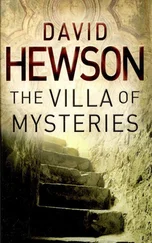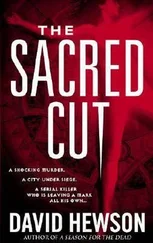He nodded at the huge portrait over the fireplace. Angelo Arcangelo, the dead patriarch, glowering at them all, his old, incisive eyes full of some harsh and bitter judgment.
“You can take that with you when you go,” the Englishman added. “Bad art offends me. I don’t want those hideous features staring down at my guests.”
There was a silence, broken only by the cough of one of Massiter’s lawyers.
“Guests?” Raffaella asked finally.
“Guests.”
It was good to tell them now.
“Not that it’s any business of yours anymore. In a year I’ll have a hotel here, and a restaurant that will put the Cipriani to shame. In two years, a gallery to steal the glory from the Guggenheim. A modest, refined shopping mall for immodest, unrefined shoppers. Suites. Apartments. Facilities. That’s what the modern world’s about, Michele. A flash of transient joy for the masses before you move them on their way. Not . . .” He scowled, couldn’t help it. He hated to see lost opportunities, even those missed by men he could exploit. “ . . . trying to squeeze a grubby living out of glass just because that’s how it always was.”
Michele Arcangelo stared at his reflection in the old polished table, for the last time.
“Gloating is an unattractive trait, Signor Massiter,” Raffaella Arcangelo said with a quiet, firm certainty.
“I’m an unattractive man,” Massiter replied immediately. “More people might notice if they weren’t so blinded by their own avarice.”
There was a noise at the door.
“Visitors,” he said. “Open the door, Gabriele. There’s a good chap.”
The brother didn’t demur for a moment, didn’t notice Michele’s vile, muttered curse. He let in Emily Deacon, by her side the young policeman, the one she’d pretended she’d abandoned, an act that never fooled Massiter for a moment. Both looked uncertain of themselves. A little afraid, perhaps.
Massiter was on his feet in an instant, striding over to Emily, kissing her quickly on the cheek, pumping the man’s hand for a second.
“This won’t be unpleasant, will it?” he asked meekly. “Please don’t spoil my day.”
“Why should it be unpleasant?” she replied.
He shrugged, looking at the little cop. “I’m sorry this brief interlude between Emily and myself turned into a personal matter, Agente Costa. It was regrettable. And . . .” He smiled to ensure they understood. “Pointless too. Those items she took from my yacht this morning . . .”
Massiter recalled the details the men had beaten out of the servant before throwing her out onto the street. It seemed a decidedly amateurish effort on Emily’s part. She had disappointed him there too.
“They’re of no use to you,” he went on. “Even in Italy there are such things as rules of evidence. You can’t try to obtain incriminating detail on a man by asking a pretty young woman to hunt for it in his bed.”
He watched the pain flicker on Costa’s face, relishing the sight. “Ah. I’m sorry. You didn’t know. Or rather, you knew, but preferred not to acknowledge the fact. Self-delusion is a habit to avoid. Particularly in a police officer.”
He glanced at his watch, then back towards the party outside. The music had begun. Massiter had chosen the piece himself. It was the very concerto that had nearly put him in jail five years before, when he’d paid for its first production on the pretext that Daniel Forster was its composer. Massiter had no great fondness for the work, or any other music for that matter. There was no money in music, no fame either, not of the kind he needed. His choice had been designed simply to make a point. That, if he wished, he could now do anything he liked.
“This is a social occasion,” he continued, noticing a new individual had now entered the room, one unknown to him, a senior-looking figure in a dark suit. “Kindly have done with it. Why are you here?”
“We’ve brought you a gift, Hugo,” Emily said, eyes glittering. “Something you’ve wanted for years.”
He laughed. “Really?”
Massiter’s right hand described a circle round the room, round the glass eye over the lagoon, the city beyond. “What gift could the likes of you possibly have for me?”
Then he saw them and fell silent, mind racing, unable to believe his eyes.
They looked dirty. Peasant clothes. Peasant features. Too long in the sun, too much brutal physical work. For a few reflective seconds Hugo Massiter asked himself what kind of terror he must have instilled in Laura Conti and Daniel Forster, to have made them inflict such an obvious punishment on themselves. Then his normal sense of composure returned, and with it a growing realisation of triumph, of total triumph, a transcendental victory greater than any even he could have imagined on such a day.
“Who are these people?” he asked, amazed, stepping up to them, touching their grimy clothes, peering into their frightened faces. “Daniel? Is it really you? Laura?”
The man retreated from Massiter’s closeness, muttering some coarse words in Veneto. The older individual in the black suit came and stood between them, flashing a card with the familiar Carabinieri badge.
“Signor Massiter,” he said. “I am Maggiore Zecchini. We believe we have apprehended the two individuals who slandered you all those years ago. We need to interview you about them. Now, please. I know you are busy. Nevertheless . . .”
Massiter found himself behind her left shoulder, trying to catch the bright, sharp, terrified glint in her eyes. She didn’t look at him. Only at the occhio, the great glass window to the lost world beyond.
“Why me?” he asked. “Why now?”
The Carabinieri major shuffled on his feet, nervous. “We have fingerprints for Forster. We know it’s him. We have no identification records for the woman. It’s important we know for sure. I understand you’re busy. This won’t take long. But it’s important we carry out a formal interview, on Carabinieri premises. I have a launch waiting outside.”
Massiter laughed and, in a single swift movement, came so close to her, gripped her shoulders, leaned down. She cringed, trying to pull away from him, but he was too powerful, and had no intention of letting go, not for anything, the disapproval he could feel around him, Emily hissing at the young agente, furious, outraged.
The police were fools. Massiter knew this all along. In a way he had no need of his present position to defeat them.
He thrust his nose into her hair, took a deep breath, hearing her begin to weep. She had the aroma of the fields and the sea, of animals and the soil. He listened to the music beyond the window and wondered how long he could bear to wait, how sweet the moment would be when he could trap her alone in a room somewhere, perhaps in a hidden corner of the apartment in the glass palazzo, where the music would still play in his head, and there would be no one, no interfering policeman, no do-gooder citizen, to prevent him taking, roughly or sweetly, the choice was hers, exactly what he wanted.
“Enough,” the young cop barked, and thrust himself roughly between their bodies, forcing her away. “You must come with us now, Signor Massiter.”
“Why?” he asked. “This man is Daniel Forster. You know that as well as I. And this is Laura Conti, who was maid to the late Scacchi, whom Forster murdered. You know that too.” He stared at her, hungrily. “I have a little influence, Laura. Whatever you think, whatever nonsense Forster may have tried to instil in your head over the years, I can and will help.”
He turned to the Carabinieri major. “She is a simple woman, Zecchini. Easily led. She’s been through enough pain already. I won’t allow any more.”
Читать дальше












